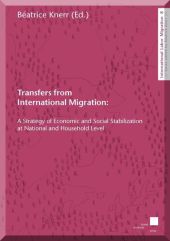 Neuerscheinungen 2012Stand: 2020-01-07 |
Schnellsuche
ISBN/Stichwort/Autor
|
Herderstraße 10
10625 Berlin
Tel.: 030 315 714 16
Fax 030 315 714 14
info@buchspektrum.de |

Béatrice Knerr
Transfers from International Migration: A Strategy of Economic and Social Stabilization at National and Household Level
Herausgegeben von Knerr, Béatrice
2012. 304 S. 21 cm
Verlag/Jahr: KASSEL UNIVERSITY PRESS 2012
ISBN: 3-86219-208-3 (3862192083)
Neue ISBN: 978-3-86219-208-3 (9783862192083)
Preis und Lieferzeit: Bitte klicken
Over the early 21st century the number of those living in countries in which they were not born has strongly expanded. They became international migrants because they hope for jobs, livelihood security, political freedom, or a safe haven. Yet, while the number of those trying to settle in richer countries is increasing, entry hurdles mount up, and host countries become more selective. While low-skilled migrants meet rejection, highly qualified are welcome. All this hold significant implications for the countries and families the migrants come from, even more so as most of them keep close relations to their origin, and many return after a longer or shorter period of time.
Some settle down comfortably, others struggle each day. Some return to their home country, others stay for good. Some loose connection to relatives and friends, others support them by remittances for livelihood security and investment. In any case, most of these international migrants are - explicitly or not - involved in various stabilization strategies, be it by household / family agreements, government efforts to attract valuable human capital, or sheer expectations by different actors.
This volume intends to span this spectrum by presenting impressive case studies covering essential facets of international migrants´ relationships within their families and societies of origin. Each case study represents an essential type of linkage, starting with financial remittances, for livelihood security or investment purposes, over social remittances, up to political influence of the Diaspora, covering the family/household, community and country level. It also considers the comparison between expectations and reality and looks into the future by assessing migration potentials.


